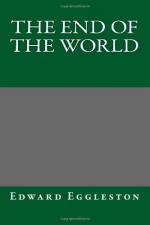“Vot vor ton’t you not shpeak? Can’t you virshta blain Eenglish ven you hears it? Hey? You a’n’t no teef vot shteels I shposes, unt you ton’t kit no troonks mit vishky? Vot you too tat you pe shamt of? Pin lazin’ rount? Kon you nicht Eenglish shprachen? Oot mit id do vonst!”
“I did not do anything to be ashamed of,” said August. And yet he looked ashamed.
“You tidn’t pe no shamt, hey? You tidn’t! Vot vor you loogs so leig a teef in der bentenshry? Vot for you sprachen not mit me ven ich sprachs der blainest zort ov Eenglish mit you? You kooms sneaggin heim Zaturtay nocht leig a tog vots kot kigt, unt’s got his dail dween his leks; and ven I aks you in blain Eenglish vot’s der madder, you loogs zheepish leig, und says you a’n’t tun nodin. I zay you tun sompin. If you a’n’t tun nodin den, vy don’t you dell me vot it is dat you has tun? Hey?”
[Illustration: GOTTLIEB.]
All this time August found that it was getting harder and harder to tell his father the real state of the case. But the old man, seeing that he prevailed nothing, took a cajoling tone.
“Koom, August, mine knabe, ton’t shtand dare leig a vool. Vot tit Anterson zay ven he shent you avay?”
“He said that I’d been seen a-talking to his daughter, Jule Anderson.”
“Vell, you nebber said no hoorm doo Shule, tid you? If I dought you said vot you zhoodn’t zay doo Shule, I vood shust drash you on der shpot! Tid you gwarl mit Shule, already?”
“Quarrel with Jule! She’s the last person in the world I’d think of quarreling with. She’s as good as—”
“Oh! you pe in lieb mit Shule! You vool, you! Is dat all dat I raise you vor? I dells you, unt dells you, unt dells you to sprach nodin put Deutsche, unt to marry a kood Deutsche vrau vot kood sprach mit you, unt now you koes right shtraight off unt kits knee-teep in lieb mit a vool of a Yangee kirl! You doo ant pe doornt off!”
August’s countenance brightened. All the way home he had felt that it was somehow an unpardonable sin to be a Dutchman. Anderson had spoken hardly to him in dismissing him, and now it was a great comfort to find that his father returned the contempt of the Yankees at its full value. All the conceit was not on the side of the Yankees. It was at least an open question which was the most disgraced, he or Julia, by their little love affair.
But more comforting still was the quiet look of his sweet-faced mother, who, moving about among her throng of children like a hen with more chickens than she can hover[1], never forgot to be patient and affectionate. If there had been a look of reproach on the face of the mother, it would have been the hardest trial of all. But there was that in her eyes—the dear Moravian mother—that gave courage to August. The mother was an outside conscience, and now as Gottlieb, who had lapsed into German for his wife’s benefit, rattled on his denunciation




